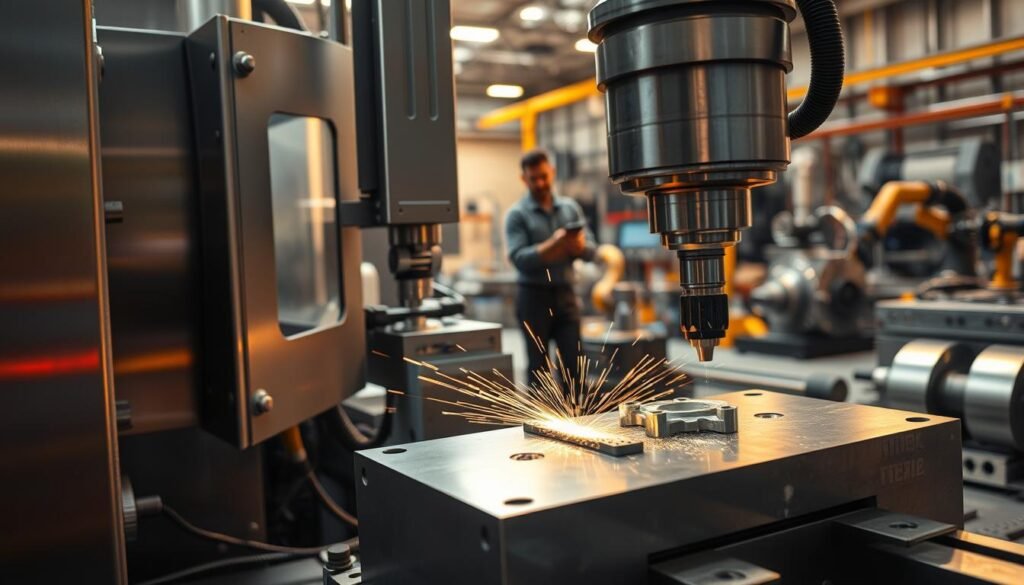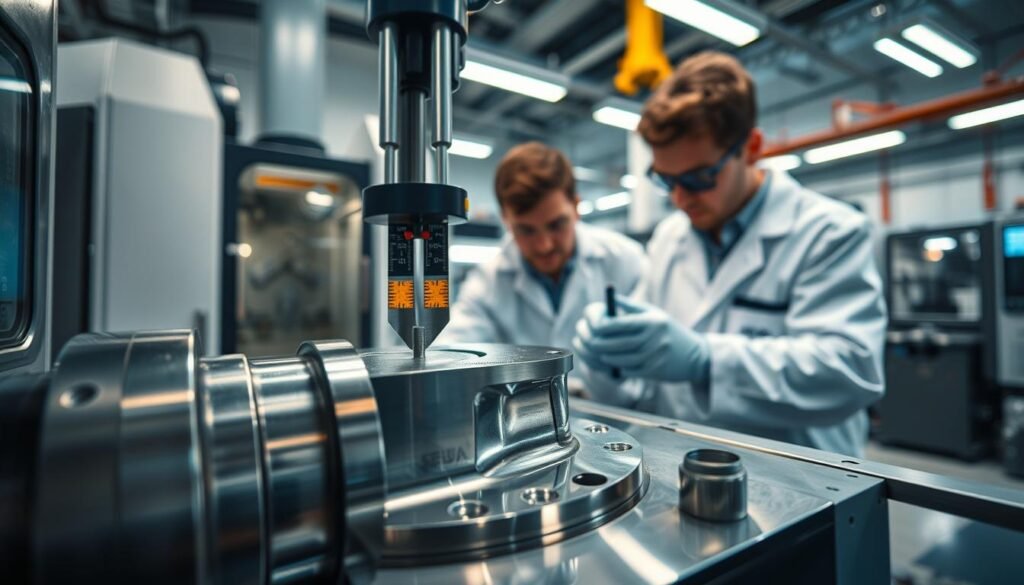Ever wondered how industries achieve unparalleled precision and productivity in their manufacturing processes?
Today, precision CNC machining is essential, not just a nice-to-have. These services boost production speeds and ensure high precision. This is vital for industries that need to keep everything exact.
Using CNC machines makes manufacturing precise and consistent. It also cuts down on material waste. This boosts efficiency and lets industries grow without lowering quality. CNC machining is key for top-notch, eco-friendly manufacturing today.
Key Takeaways
- Precision CNC machining offers unmatched precision in manufacturing.
- CNC efficiency leads to faster production times.
- Advanced machining services ensure consistent and high-quality outcomes.
- Material waste is significantly reduced with CNC technology.
- Enhanced manufacturing processes support scalable operations.
Understanding CNC Machining
The CNC machining process is an advanced technology. It uses special software to control factory tools and machinery. This makes the manufacturing process more efficient by cutting down on mistakes made by humans.
Definition and Process
CNC (Computer Numerical Control) machining means computers control factory tools. A digital design is made and turned into a code that the CNC machine follows. This process makes sure parts are made with great accuracy using tools like mills and routers.
Advantages Over Traditional Machining
CNC machining is better than older methods in several ways. It offers superior accuracy, reducing errors and improving product quality. The machines also work faster and can do complex designs easily. This makes them perfect for a wide range of uses.
Materials Used in CNC Machining
CNC technology can handle many materials. It works with metals like aluminum and stainless steel, and also plastics like polycarbonate. It’s also good for composites, foam, and wood. This flexibility makes it suitable for sectors like aerospace, electronics, and more. Below is a comparison of materials:
| Material Type | Examples | Applications |
|---|---|---|
| Metals | Aluminum, Steel, Titanium | Aerospace, Automotive, Robotics |
| Plastics | Polycarbonate, Nylon, PVC | Consumer Electronics, Medical Devices |
| Composites | Carbon Fiber, Fiberglass | Marine, Sporting Goods |
| Foam | Rigid Foam, Carving Foam | Prototyping, Packaging |
Enhanced Precision and Accuracy
Industries like aerospace, medical, and automotive really count on being very precise. Even small mistakes in parts can cause huge problems. That’s why using high-precision CNC machining is so important in these areas.
Importance in High-Tolerance Industries
Aerospace companies rely on CNC machining to make sure airplane parts are up to strict standards. This makes sure planes are safe and work well. In medicine, CNC machining is key for making complex tools that follow tough health rules. It’s also crucial in the car industry to make sure parts are exact. This ensures cars are reliable and work efficiently.
| Industry | Application | Importance of Precision |
|---|---|---|
| Aerospace | Aircraft Components | Ensures safety and performance |
| Medical | Surgical Tools | Meets health regulations |
| Automotive | Engine Parts | Ensures reliability and efficiency |
Technological Advancements Driving Precision
New CNC tech, like top-notch CAD/CAM software and precise tools, has made a big difference. These improvements let machinists work with amazing accuracy. So, parts match their designs perfectly.
Increased Productivity and Efficiency
Making CNC machining more efficient is key. We use advanced methods and tools to make our processes better and faster. This helps us get excellent results.
Reducing Production Cycles
CNC machining makes production quicker by cutting down setup and operation time. This speeds up how fast we can get things done. Using these approaches makes CNC work faster and finish projects quicker.
Unattended Operations and 24/7 Production
Modern CNC machines can work by themselves, day and night. This ability to work all the time increases how much we can make. It helps us meet deadlines and manage big projects easily.
Optimizing Tooling Setups
Making tool setups better is very important for working more efficiently. Improving how we set up CNC tools cuts down on waiting times. It keeps tools ready for use right away.
| Aspect | Benefit |
|---|---|
| Production Cycles | Significantly reduced due to streamlined operations |
| 24/7 Operations | Unattended, continuous production |
| Tooling Setups | Optimal setups minimize downtime |
Benefits of CNC Machining Services
One major plus of CNC machining benefits is saving money while reducing waste. CNC machining uses precise cuts and careful planning. This means less scrap material is used. So, manufacturers find CNC machining to be a cost-saving and efficient choice. This method lowers production costs and reduces waste, making manufacturing more eco-friendly.

Cost Savings and Waste Reduction
CNC machining allows for high accuracy, which cuts down on waste during production. This reduction in waste leads to lower material costs. Hence, CNC machining is an incredibly cost-saving choice. The process is reliable and repeats well. Each cut is planned to make the most out of the material, avoiding extra costs.
Consistency and Reproducibility
Another key CNC machining benefit is its ability to produce parts that are always the same, ensuring reproducibility in every batch. This consistent quality means that products meet top standards every time. It eliminates variability and ensures reliability in all production. For industries needing exact precision and uniformity, this reproducibility is crucial.
Versatility in Material and Operation
CNC machining stands out for being highly versatile in materials and operations. It is essential across many industries. CNC material versatility lets us handle a variety of materials. These include metals like aluminum and steel, as well as non-metals such as plastics and wood. Thanks to this, companies can fulfill various project needs with great precision and efficiency.
The flexibility of CNC operations further boosts this process. CNC machines can quickly switch between tasks, supporting a wide range of manufacturing demands. This adaptability is key for meeting different production needs, from prototyping to mass production.
Now, let’s explore the key advantages of CNC material versatility and CNC operational flexibility:
| Material Type | Metal (e.g., Aluminum, Steel) | Non-Metal (e.g., Plastic, Wood) |
|---|---|---|
| Properties | High Strength, Durability | Lightweight, Easily Moldable |
| Applications | Automotive, Aerospace, Medical Devices | Consumer Goods, Furniture, Electronics |
By using the material and operational flexibility of CNC machinery, we achieve top-notch results. This covers a wide range of industrial and commercial needs. CNC machining is the leading solution for modern manufacturing challenges. It excels at producing high-precision parts and complex shapes.
Quality Assurance in Every Step
We make sure every part of the CNC machining process is top-notch. From the start to the end, we follow strict CNC quality assurance rules. This means every piece meets the high CNC precision standards needed for important jobs, like making medical devices or aerospace parts.
We take pride in our CNC industry certifications. They prove we can make parts that impress our customers every time. Our work on things like detailed surgical tools and vital aerospace parts shows our commitment to CNC quality assurance. This ensures everything we make is reliable, safe, and works well.

To explain how we keep our promise of quality, here’s a brief outline:
| Step | Description |
|---|---|
| Design Verification | Initial files are reviewed to make sure they match customer needs and CNC precision standards. |
| Material Inspection | We check materials when they arrive to ensure they meet CNC industry certifications and required standards. |
| First Article Inspection | A sample part is made and checked to see if it meets design and quality rules. |
| In-Process Monitoring | We keep an eye on the making process to find and fix any mistakes quickly. |
| Final Inspection | The finished product is thoroughly checked to make sure it follows all CNC precision standards. |
By doing all these steps, we make sure our work is the best in CNC quality assurance. We go beyond just meeting CNC industry certifications. Our strong focus on quality makes us stand out in the competitive world of CNC machining.
Conclusion
CNC machining offers key benefits to modern manufacturing, like better efficiency and precision. These advances lead to savings in cost. By using CNC technology, companies can improve their productivity and quality. This puts them ahead in the worldwide market. CNC machining beats old-fashioned methods with its top-notch accuracy and faster production times. Industries with strict standards need this.
Services in CNC machining help by reducing waste and making tool setups more efficient. This lowers costs and is better for our planet. Also, the ability to use different materials and run machines day and night adds flexibility. This meets a variety of manufacturing demands.
With new tech developments, the perks of precise CNC machining are increasingly clear. Companies that adopt this tech will likely lead their markets. CNC machining not just makes manufacturing smoother. It also guarantees consistency, can be relied upon, and ensures the highest quality in every production phase.
FAQ
What is CNC machining and how does it work?
CNC machining uses computers to control machine tools for making parts. A CAD model is turned into a CNC program using CAM software. This tells the machine how to make the part from the material.
What advantages does CNC machining have over traditional machining?
CNC machining is more accurate, flexible, and cost-effective than old methods. It reduces mistakes and ensures top quality. This makes it perfect for industries needing precise work.
What materials can be used in CNC machining?
CNC machines can shape many materials including metals like aluminum, and plastics like ABS. This makes them useful in various fields such as aerospace and electronics.
How does CNC machining ensure high precision and accuracy?
Precision in CNC machining comes from advanced software and tools. They help meet strict standards, important for aerospace and medical fields.
What are the productivity benefits of CNC machining?
CNC machines boost productivity by cutting down on production time and allowing for non-stop work. They deliver faster results and more output efficiently.
How does CNC machining contribute to cost savings and waste reduction?
CNC machining cuts waste by using materials well. It’s accurate, preventing errors that can waste resources and save money.
Why is consistency and reproducibility important in CNC machining?
Consistency is key in CNC machining to ensure all parts meet quality standards. It makes sure products are reliable and match perfectly.
In what ways does CNC machining offer versatility in material and operation?
CNC’s ability to handle different materials and complex designs adds to its versatility. It can do many tasks in one setup, making manufacturing smoother.
How is quality assurance maintained in CNC machining?
Quality in CNC machining is kept high through detailed programming, using the best materials, and strict inspections. Every step is checked to meet design specs and standards.




